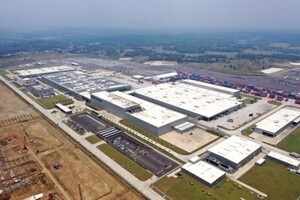In September 2022, Hyundai Motor completed the construction of the Hyundai Motor Manufacturing Indonesia (HMMI) plant at the Bekasi Deltamas Industrial Complex, marking a milestone in its efforts to enter the ASEAN market. The facility, which will benefit from an investment of approximately USD 1.55 billion on a site of approximately 777,000 square meters by 2030, is Hyundai Motor Group’s first finished vehicle plant in the ASEAN region.
Hyundai Motor’s strategic focus on the ASEAN market is underlined by its impressive performance in Indonesia. Last year, the company sold 7,475 electric vehicles, securing the largest market share of 44.3% in the Indonesian market. According to the ASEAN Automobile Federation, the ASEAN automobile market reached 3,355,136 units last year, with Indonesia accounting for the largest share at 29.9%. It is followed by Malaysia (23.9%), Thailand (23.1%), the Philippines (12.8%), Vietnam (9.0%), Singapore (1.1%) and Myanmar (0.1%).
Hyundai Motor’s strategy is to differentiate itself through stable product development, production and sales systems in Indonesia and the broader ASEAN region. This includes the currently operating Vietnamese manufacturing subsidiary (HTMV) and the Singapore Global Innovation Center (HMGICS) completed last year. “In a rapidly evolving ASEAN automobile market, driven by strengthened government support policies and diversified vehicle preferences, Hyundai Motor plans to use Indonesia as a bridgehead for its ASEAN strategy,” a Hyundai Motor spokesperson said.
On July 1, Hyundai Motor announced that it will market the new Kona Electric (EV) equipped with batteries produced by HLI Green Power, a battery cell production joint venture established by Hyundai Motor Group and LG Energy Solution at the Karawang New Industrial Complex (KNIC) in Indonesia. This move makes Hyundai Motor the first automaker in Indonesia to establish a local system for the production and sale of EV battery cells all the way to finished vehicles.
HMMI has achieved significant results in just over two years of operation. In the first quarter of this year (January to March), HMMI’s production capacity was 20,300 units and its production performance was 22,520 units, recording an operating rate of 110.9%. This is the highest figure among foreign factories, excluding the Korean factory (114.9%). HMMI’s operating rate, which was 50.3% in the first quarter of last year, increased to 63.6% in the fourth quarter of the same year and exceeded 100% in the first quarter of this year, showing rapid growth.
The production of the Kona Electric is significant as it represents Hyundai Motor’s commitment to establishing a full-fledged electric vehicle ecosystem in Indonesia. “By establishing a full-fledged electric vehicle ecosystem, Hyundai Motor explained that it could significantly improve the efficiency of electric vehicle production by reducing logistics costs and shortening battery supply lead times,” said the company. In the medium to long term, Hyundai Motor is expected to build a local image by establishing a production value chain in Indonesia.
Indonesia had a population of 277.5 million last year, placing it fourth in the world after India, China and the United States. The Indonesian government expects the population to reach 324 million by 2045. Indonesia is also considered an advantageous country for mining and refining nickel, an essential material for vehicle batteries electricity, based on the largest nickel reserves in the world (21 million tonnes in 2021, according to the US Geological Survey). The Indonesian government banned nickel ore exports in 2020, allowing only domestic battery manufacturing and processing. The government also announced plans to increase the national market share of electric vehicles to 25% by 2030.
To achieve this, the government is encouraging consumer purchases by introducing measures such as the luxury tax exemption (PPnBM) and the odd-even vehicle restriction policy exemption for electric vehicles. Building on this momentum, the Indonesian government plans to increase annual production of electric vehicles to 600,000 units by 2030 through foreign investment.
Hyundai Motor’s investment in Indonesia, including the establishment of HMMI and its rapid growth, highlights the company’s commitment to the region. By leveraging Indonesia’s strategic advantages and government support, Hyundai Motor aims to consolidate its position in the ASEAN market and contribute to the region’s growing electric vehicle ecosystem.


